#Lespedeza bicolor
Explore tagged Tumblr posts
Text

Bushclover (Lespedeza Bicolor) Kanazawa, Japan
#photographers on tumblr#nature#flowers#purple#autumn#fall#pink#floral#flores#otoño#bushclover#lespedeza#lespedeza bicolor#kanazawa#japan#original photographers#original photography#vertical
142 notes
·
View notes
Text




Lespedeza bicolor
57 notes
·
View notes
Text

神社まで散歩に行く途中の
住宅の垣根で咲いていた、
ピンク色の「ヤマハギ(山萩)」の花。
ハギ属。
学名:Lespedeza bicolor
撮影:iPhone14 Pro Max
42 notes
·
View notes
Text

Lespedeza bicolor / Shrubby Bushclover at the Sarah P. Duke Gardens at Duke University in Durham, NC
#Lespedeza bicolor#Lespedeza#Fabaceae#Shrubby Bushclover#Shrub lespedeza#Bicolor lespedeza#Bushclover#invasive plants#Plants#Flowers#Nature photography#photography#photographers on tumblr#Sarah P. Duke Gardens#Duke Gardens#Duke University#Durham#Durham NC#North Carolina#🌺🌻
9 notes
·
View notes
Text

萩が花盛り(9月15日)
Lespedeza dwubarwna (Lespedeza bicolor)
shrubby bushclover, shrub lespedeza, or bicolor lespedeza (Lespedeza bicolor)
#Lespedeza bicolor#shrubby bushclover#shrub lespedeza#bicolor lespedeza#Lespedeza dwubarwna#ハギ#萩#flowers#kwiaty#japan#花
1 note
·
View note
Text

山萩[Yamahagi] Lespedeza bicolor
Hagi is one of the seven autumnal grasses and is a seasonal word for autumn in the haiku world. In reality, the flowering season is from about June to September, and strictly speaking, its season word also refers to "early" autumn.
The tree in the photo is in a low mountain range where I sometimes go in search of flowers, and it produced flowers little by little around summer in previous years. But not so this year, and I did not see any of them at that time.
However, when I went out a couple of days ago, it was in full bloom. This summer was extremely hot, and that may have had an impact.
These flowers, which had been brightly decorating a part of the thicket, somewhat seemed to have deepened in color.
ゆきゆきて たふれ伏すとも 萩の原
[Yuki yukite taorefusu tomo hagi no hara] Keep going and going, even if I used up all my energy and collapse halfway through, I want that place to be a field of Hagi in bloom. By Kawai Sora when he traveled with Matsuo Bashō along the Oku no Hosomichi https://en.wikipedia.org/wiki/Sora's_Diary
42 notes
·
View notes
Text
(windowverse) putting lespedeza bicolor and moonflowers in Miles Warren's yard for very innocent and definitely legal reasons*
*definitely not for DMT and Datura or anything
#he's also cultivating amanita citrina but that's not in the front yard#some kind of irony in ben doing yardwork and gardening for warren so warren can microdose him with psychedelic poisons#no pet toads tho#too obvious#nadia rambles#arghwrites#came in through the window last night#i'm normal#as a sidenote in contrast to kaine and peter who both are medicated ben ends up like#100% completely straightedge except for coffee lol
0 notes
Photo







2 notes
·
View notes
Photo








梨木神社(萩)から京都御苑(彼岸花) Kyoto Palace Garden
#Pentax *istD#FA macro 50mm F2.8#kyoto#Kyoto Palace Garden#snap#2008#September#9月#Nashiki shrine#Lespedeza bicolor#Lycoris radiata#dog#people#carp
0 notes
Photo

Lespedeza bicolor
Yamahagi
23 notes
·
View notes
Text
Nampō Roku, Book 2 (47): (1587) Eighth Month, Tenth Day, Morning.

47) Eighth Month, Tenth Day; Morning.
◦ Two-mat room.
◦ [Guests:] Maki hyōtai [牧兵太], Shiba kenmotsu [芝監物].
In all matters, everything was the same as on the second.
_________________________
¹Hachi-gatsu tō-ka, asa [八月十日、朝].
The date was September 12, 1587, in the Gregorian calendar.
On this occasion, the two guests were two of Rikyū's personal disciples -- albeit high-ranking government officials. Perhaps they were discussing the logistics of the Kitano ō-cha-no-e [北野大茶の會]; or, perhaps they were simply enjoying chanoyu at a time when there were no pressing official duties.
²Nijō shiki [二疊敷].
The two-mat room in Rikyū's official residence.

³Maki hyōtai [牧兵太].
This refers to Makimura Toshisada [牧村利貞; 1546 ~ 1593], who is also sometimes known as Makimura Masayoshi [牧村政吉]. He served as the Deputy-minister of the War Department (hyōbu-no-daisuke [兵部大輔]); and he was also one of the men whom Hideyoshi permitted to learn the gokushin-no-futatsu-gumi temae [極眞二つ組手前] from Rikyū (and so his name is usually found on the list of the Rikyū shichi-tetsu [利休七哲]). He was, therefore, a man who had earned Hideyoshi's trust.
⁴Shiba kenmotsu [芝監物].
Shibayama Shun-ichi [芝山俊一; his dates of birth and death are unknown], was also known as Shibayama Sōkō [芝山宗綱]*. He served as a kemmotsu [監物], an auditor in the Ministry of Civil Affairs; and another of Rikyū's personal disciples. Shun-ichi was also another of the men who were permitted to learn the gokushin no futatsu-gumi temae, and so his name is generally included among the Rikyū shichi-tetsu, too. __________ *Sometimes rendered Shibayama Munetsuna [芝山宗綱], according to the usual Japanese pronunciation for personal names -- though Sōkō [宗綱] seems to have been a sort of professional "tea name."
⁵Shoji, futsu-ka dōzen [諸事、二日同前].
Shoji [諸事] means “everything.”
Therefore,
○ shoza [初座]:
◦ Kokei Sōchin's [古溪宗陳] saiji [細字] bokuseki [墨跡];
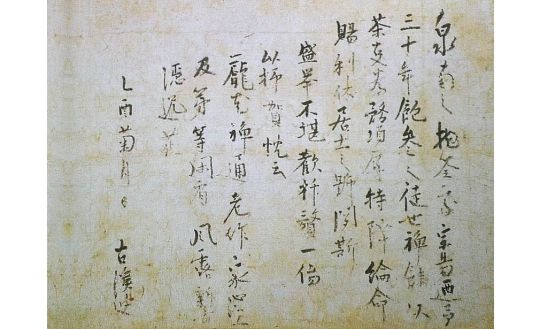
◦ the (second) small unryū-gama [小雲龍釜], arranged in Jōō's small Chōsen-buro [小朝鮮風爐];
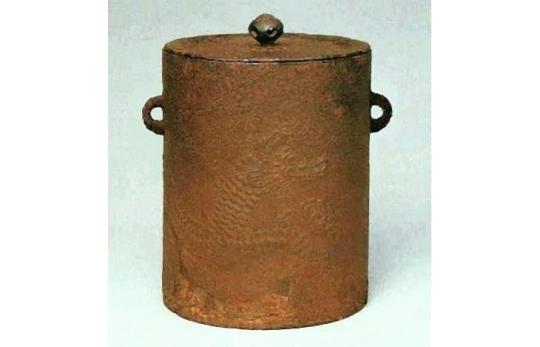

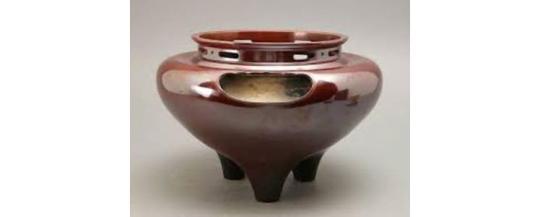
◦ (presumably) Rikyū's ruri-suzume kōgō [瑠璃雀香合] and a go-sun-hane [五寸羽], arranged side-by-side on the tsuri-dana.

○ Goza [後座]:
◦ the chabana (the kind of flowers is not known) arranged in an oki-zutsu [置き筒], standing on an usu-ita in the middle of the toko;
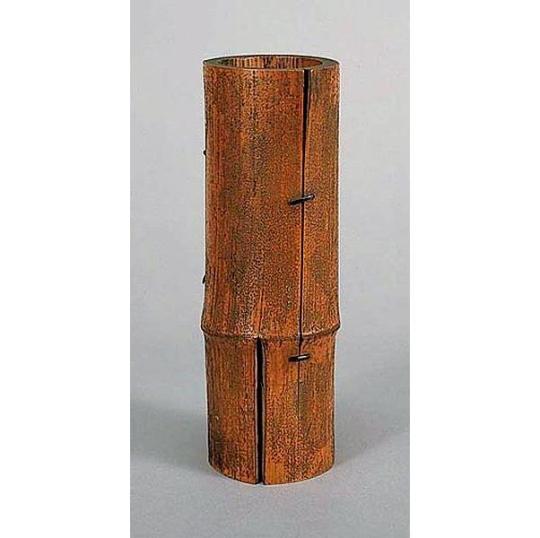
As on the second day of the Eighth Month, the flower or flowers used were not specified. Most likely (since an oki-zutsu was used, meaning that the flowers would have been things that naturally are encountered in nature blooming below eye level) Rikyū would have arranged several autumnal grasses as his chabana, since it is now the beginning of that season.
The “seven grasses of autumn” (aki no nana-kusa [秋の七草]), for example, are:
- hagi [萩] (bush clover, Lespedeza bicolor]);
- obana [尾花] (also known as suzuki [芒], pampas grass, Miscanthus sinensis);
- kuzu [葛] (the kuzu vine, Pueraria montana var. lobata);
- nadeshiko [撫子] (Japanese pink, Dianthus superbus var. longicalycinus);
- ominaeshi [女郎花] (patrinia, Patrinia scabiosifolia);
- fujibakama [藤袴] (thoroughwort, Eupatorium japonicum); and.
- kikyō [桔梗] (bellflower, Platycodon grandiflorus).
And while several of these flowers were traditionally not used for chabana (ominaeshi [女郎花] and fujibakama [藤袴] are mentioned as being “forbidden from being put in a hanaire” in Jōō’s famous pair of poems; and kuzu [葛] is usually not used as well because of its extremely strong honey-like fragrance), the others were staples. If Rikyū used several flowers out of a collection (as might have been the case), he may not have remembered precisely which he used when it came time to write the details down -- and neither would he have thought detailing them that important for his records.
◦ Rikyū's Shigaraki mizusashi [信樂水指], with the hishaku resting on top, and the chaire (a ko-natsume) displayed on the mat in front of it;
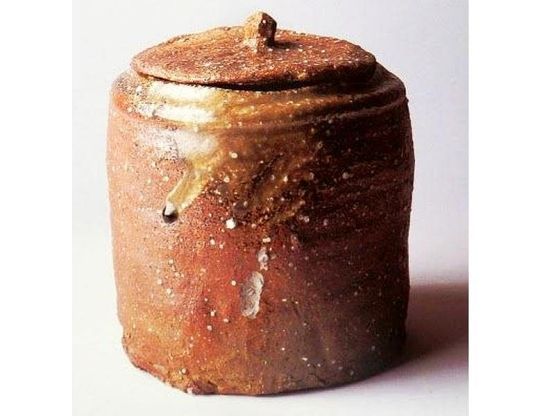
◦ ko-natsume [小棗], tied in a shifuku;
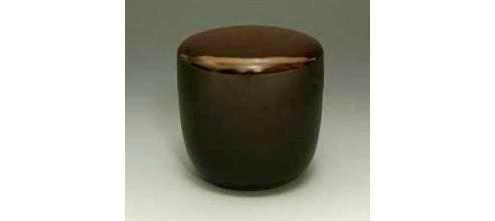
◦ the meibutsu Rinzai-in futaoki [臨濟印蓋置], placed by itself in the middle of the tsuri-dana;
◦ the Hikigi-no-saya [引木の鞘] chawan was brought out at the beginning of the koicha-temae,
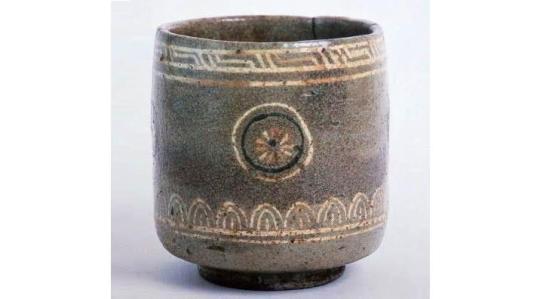
◦ with an ori-tame [折撓] resting across its mouth;

◦ the koboshi was probably a mentsū [面桶].
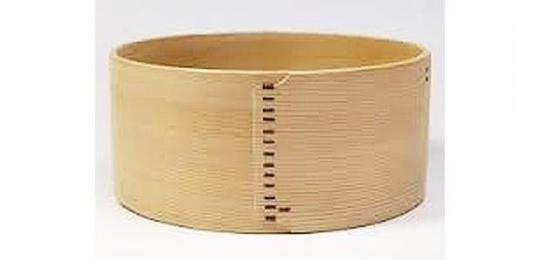
○ The kane-wari:
- the shoza was chō [調] (toko, kakemono; room, ō-ita furo; tana, kōgō and habōki, side-by-side with each touching a different kane);
- and the goza was han [半] (toko, chabana; room ō-ita furo, mizusashi with the ko-natsume placed in front and the hishaku resting on top; and the meibutsu Rinzai-in futaoki [臨濟印蓋置] in the exact center of the tana).
○ As for the kaiseki, the menu apparently consisted of:
▵ saku-saku jiru [さくさく汁] (miso-shiru containing chopped fresh greens);
▵ mozuku [海蘊] (a filamentous green seaweed, served raw, with a dressing of rice-vinegar flavored with sake and mirin);
▵ charcoal-grilled ayu [鮎];
▵ nimono [煮物], featuring matsu-take [松茸] (the pine mushroom);
▵ and as the kashi, senbei [煎餅] (rice crackers), and yaki-guri [焼き栗] (roasted chestnuts).
0 notes
Photo

ヤマハギ Shrubby bushclover、Shrub lespedeza、Bicolor lespedeza
[related] キハギ、マルバハギ、ニシキハギ、ミヤギノハギ、ヤマハギ、ヤハズソウ、マルバヤハズソウ、ネコハギ、メドハギ、イヌハギ、マキエハギ
the area around my field |19 Apr 2022
0 notes
Photo

_Popillia japonica_ #Japanese_beetle #マメコガネ on _Lespedeza bicolor_ #bicolor #lespedeza #bushclover #ヤマハギ (三ツ寺公園)
0 notes
Text

神社境内に散歩に行った時、
鳥居の傍で咲いていた、
「ヤマハギ(山萩)」の白い花。
ハギ属。
学名:Lespedeza bicolor
撮影:iPhone14 Pro Max
29 notes
·
View notes
Text

Lespedeza bicolor / Shrubby Bushclover at the Sarah P. Duke Gardens at Duke University in Durham, NC
#Lespedeza bicolor#Shrubby Bushclover#Shrub lespedeza#Bicolor lespedeza#Flowers#Nature photography#photographers on tumblr#Sarah P. Duke Gardens#Duke University#Duke Gardens#Durham#durham nc#North Carolina
0 notes
Link
Description : Egrow 50 Pcs/Pack Lespedeza Seeds Lespedeza Semente Plant Lespedeza Bicolor Tree Specifications : Quantity : 50 pcs Germination time : 15-25 days For germination temperature : 18-25 ...
0 notes